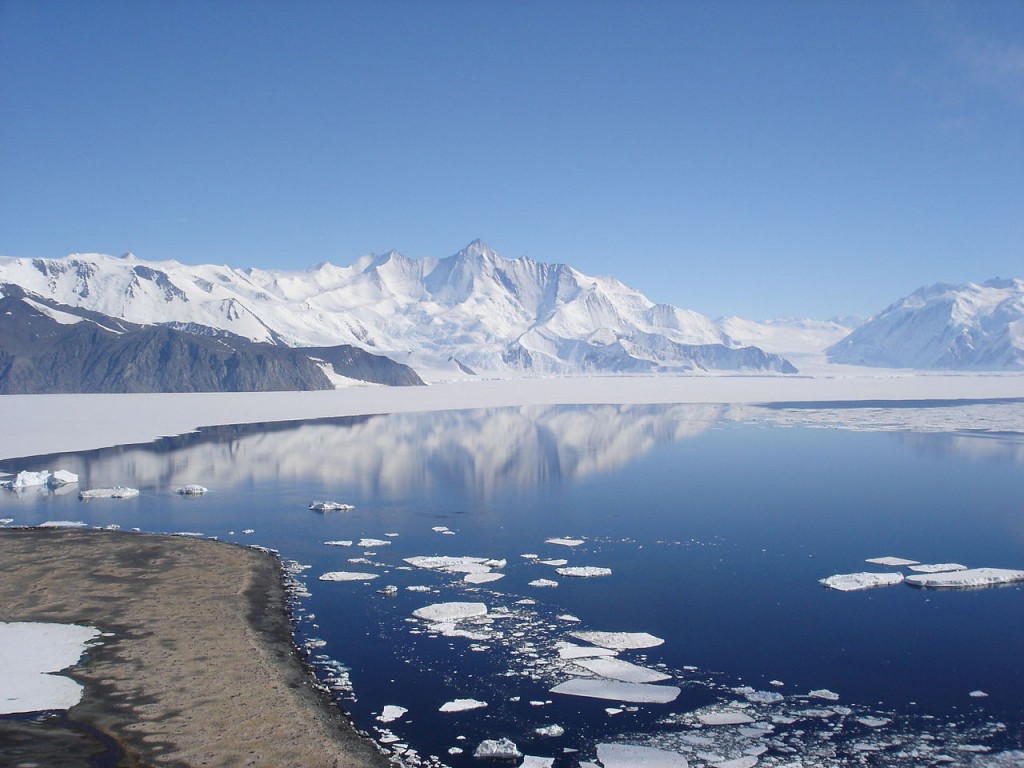German scientists Dr. Sebastian Lüning and Prof. Fritz Vahrenholt, authors of the German climate science critical book “Die kalte Sonne”, available in English as “The Ngelected Sun“, call the recent claims made by DeConto et al that Antarctica could melt more quickly than expected: “crazy climate alarmism”.

Mt. Herschel Antarctica. Photo by Andrew Mandemaker, CC BY-SA 2.5
At their climate science critical site, Die kalte Sonne here, they write:
=====================================
At the end of March, 2016, climate alarmism once again was spread through the public. This time the Biblical flood was chosen. At Spiegel Online one could read:
Climate prognoses: Antarctic ice could melt more rapidly than expected
How stable is Antarctic ice? The answer to that question determines how high the sea level will rise in the future over the long-term. A new model calculation shows that the oceans could rise much more rapidly by the end of the century than what models showed previously due to melt water. Earlier experts from the UN IPCC expected a comparatively moderate sea level rise of 18 cm from melting ice from Antarctica by 2100. For the current century scientists see glacier melt and retreat of ice in Greenland as the most important factors for sea level rise. Computer simulations by scientists led by Robert DeConto of the University of Massachusetts, appearing in the journal of Nature, however, see in the worst case a rise of up to one meter alone from ice from Antarctica by 2100.”
Oh man. Antarctic sea ice is in fact growing currently, which isn’t keeping the alarmists from writing stories telling the opposite.
Here are the facts [for German readers, citing renowned institutes]:
- NASA-Studie mit überraschendem Befund: Antarktische Eiskappe wächst derzeit und bremst globalen Meeresspiegelanstieg
- Neue ICEsat-Satellitendaten sind da: Antarktischer Eisschild hat an Masse zugelegt
- Alfred-Wegener-Institut: Ostantarktischer Eisschild ist stabil und wächst sogar leicht an
- Potsdam-Institut für Klimafolgenforschung: Antarktisches Inlandeis wird im Zuge der Erderwärmung anwachsen
- Ostantarktischer Eisschild stabiler als gedacht: Eis überstand selbst Wärme des Pliozäns vor 4 Millionen Jahren
Also see the recent post at WUWT: “DeConto and Pollard – An Antarctic Science (Fiction?) Disaster”





Pierre, can you fix your posts so that when I share on FB I get a nice summary and the picture. Articles without pictures do not sell, and it is frustrating to have to reconstruct your stuff so my folks will read it.
Thanks, Larry
[…] Source: Sea Level Hysteria: German Climate Experts Call Claim Antarctica Could Melt Faster “Crazy Climate … […]
Nice shuffle there. Sea ice is not what DeConti, et al were talking about. They were writing about ice shelves which are floating platforms of ice on the coast where glaciers flow out to sea.
Sea ice forms from freezing of the ocean.
“‘potential’ to do what exactly?” – Edward.
Why, provide limitless opportunities to publish endless garbage, thereby ensuring an unceasing flow of grant money, and a solid career as climate agitator, of course.
(Disregard duplicate. It belongs below, and not here.)
“Sea ice forms from freezing of the ocean.” – Eli Rabett
…or from bits that bread off from an ice shelf and float away.
But there was no “Nice shuffle there.” Probably just an simple error that is of no significance, especially since sea ice is nothing to worry about, since when it melts it leaves sea level the same as before it melted.
It’s easy to get confused when even NASA calls it “sea ice.”
http://www.nasa.gov/content/goddard/antarctic-sea-ice-reaches-new-record-maximum/
……
“potential” to do what exactly?
“we use a model” – enough said. Once more, another what if/shock horror scenario! and more global warming rot from Messrs, DeConto and Pollard.
Plus, as I’ve said often enough, that, calving glaciers are no measure of, and certainly, are, no indicator of melt.
In actual fact, greater calving of the Austral Polar ice sheet is indicative of greater accretion at the top of the ice cap/sheet ie the ice sheets are growing!
Inner Antarctica, where polar temperatures are way below freezing for all of the year, it would take a significant, an astonishing warming event to kick start any fundamental change in the Austral ice sheet.
Lastly, more ice floes, ice bergs out at sea doesn’t raise SLs but then you should know that.
“‘potential’ to do what exactly?” – Edward.
Why, provide limitless opportunities to publish endless garbage, thereby ensuring an unceasing flow of grant money, and a solid career as climate agitator, of course.
I predict that coastal flood insurance rates are going up.
http://www.insurancejournal.com/news/national/2016/04/12/405089.htm
“Margaret Davidson, NOAA’s senior advisor for coastal inundation and resilience science and services, and Michael Angelina, executive director of the Academy of Risk Management and Insurance, offered their take on climate change data in a conference session titled “Environmental Intelligence: Quantifying the Risks of Climate Change.”
Davidson said recent data that has been collected but has yet to be made official indicates sea levels could rise by roughly 3 meters or 9 feet by 2050-2060, far higher and quicker than current projections. Until now most projections have warned of seal level rise of up to 4 feet by 2100.”
Ric W. quotes,
“sea levels could rise by roughly 3 meters or 9 feet by 2050-2060,”
====================================
Wow, the alarmist have gone insane.